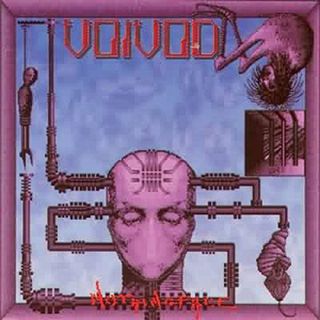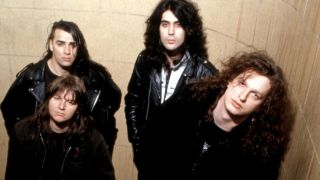“I filmed everything. It was pretty crazy; police horses charging and these deafening bombs. It was amazing to watch from my balcony because it looked like a science fiction movie.”
Michel ‘Away’ Langevin had a front row seat to last spring’s student riots in Quebec. The protest against rising tuition fees happened right below the drummer’s Montreal apartment, but for a musician who has always had a broad worldview, as well as a sometime out-of-this-worldview, the uprising in his home province was just a glimpse at the wider shift that was affecting the planet, which in turn became the basis for Voivod’s 13th studio album, Target Earth. “Everything was happening right beside my building – there were helicopters above, so slowly my art turned into a destroyed city and it’s really due to the crazy things that were happening outside my door,” the drummer and graphic artist says. “Everything is so live, on the internet and on TV, that there is a lot to pick from when the time comes to write a concept for a sci-fi album.
“When we started writing Target Earth, I think it was early 2010, and all of a sudden the Occupy movement and the Arab Spring and the nuclear accident in Fukoshima brought me back to when we were writing [1987 album] Killing Technology and there was the Chernobyl accident, so in a way it’s all the same worries we’re having right now about pollution, high-tech weaponry, destruction of the Earth, but it’s just that we have it live on TV. It’s pretty scary for everybody, I guess.”
Voivod formed in 1981 in the industrial Canadian city of Jonquiére, with only Away the constant in the ever-evolving outfit that started life as a punk-thrash band. This new album sees the band reignited following the tragic death of their guitarist and musical mastermind Denis ‘Piggy’ D’Amour seven years ago. Reunited with founding vocalist Snake since 2002, Target Earth also marks the return of bass player Blacky, who brought with him new guitarist Dan ‘Chewy’ Mongrain, a Voivod fan and devotee of Piggy’s mindbending guitar runs.
Few bands dare to step out of their box, especially in the proto-thrash metal days of the early 1980s, but Voivod didn’t so much burst out of theirs but into the stratosphere, where they used tales from outer space to craft intergalactic songs that were both caustic and cacophonous, but also carefully crafted and incredibly intricate. However, for this album, the first for Century Media Records, the band have come back to earth.
“There is no space concept,” Away admits. “Target Earth, the song, is about a hacker that takes control of the satellites around the planet and turns them towards specific countries to blackmail them. That’s an example of what’s going on with this album. Every song has its own story.”
There’s one song that truly stands out. With a strident tattoo of drums and a haunting guitar intro that lurches into an industrial and harrowing riff-based frenzy, Corps Étranger is sung entirely in French – which, surprisingly, is a first for the native Francophones.
“It was a great experience,” says Away. “We have been talking about doing a French song for years, but it was a strange contrast to our ears. Actually, I think that Snake found it difficult to write in French, he was a lot more self-conscious. But we thought singing in English would be an obstacle when we started. It might sound like Yoda at times, but we did have to move to Montreal to accelerate the process because we come from the woods and it’s pretty isolated.”
It was that move 300 miles south that cemented the foundations of the band Away and his friends yearned to become. The escape from a town with little prospects for four starbound idealists is a typical rite of passage, but for this band, it was an essential mission to launch Starship Voivod.
“We moved to Montreal after we did [1984 debut album] War And Pain. We did that when we were still at our parents’ places and once it made a good impression, we realised that we could actually all drop out of school and try to have a career, and so in 1985 we moved. We were very poor because we all had $150 each from the government and we were living, the four of us, in an apartment infested with cockroaches. Eventually, by the time we did Dimension Hatröss in 1988, we signed a deal with MCA and we could move into separate apartments, but we lived together and rehearsed every night for many years.”
Living in such close quarters could have been the breaking point for Voivod, but there was one thing that kept the band – and the friendships – going, and that was music, especially prog rock. Despite being labelled a thrash band in their early days, it was clear that these four musicians weren’t just spending their days listening to the new sounds burgeoning from California’s Bay Area heavy metal scene. There was much more to Voivod than relentless drums and ravaging guitar riffs and that was precisely why these strange creatures from the north stood out and caught the attention, initially, of Metal Blade, and later ensure their move onto a major label.
“Progressive rock has always been very popular in Quebec,” Away remarks when asked how he discovered his biggest influence. “Of course, bands like Yes, Genesis and Pink Floyd are huge, but you’ll also find a very big public for the more obscure bands like Van der Graaf Generator, which is my all-time favourite band. I was listening to that material in the 70s when I was a teenager, along with rock and later punk, like The Damned and Sex Pistols. Actually, it was Piggy who introduced me to krautrock like Faust, Can, Amon Düül II and Birth Control, and that had a strong impact on me, especially Nektar. I thought the artwork was amazing and also the music was mind-blowing.
“We started writing music that was integrating the new wave of British heavy metal, old 70s prog rock and hardcore punk, but there were also other elements to our music that came from an alternative movement, like Killing Joke or Bauhaus and avant-garde music like Stockhausen. But of course, the progressive rock element was important in Voivod. We were able to learn to play enough so we could really explore it on Dimension Hatröss, but we always intended to be a prog-metal band.”
Nektar, Stockhausen, Birth Control? In a world of YouTube and Spotify, it’s not unusual for a young music fan to seek out these leftfield gems, but in late-70s Northern Quebec, how did the teenage Away and his friends find these records?
“It was actually through a cousin of Piggy’s who was into strange music, a guitar player,” says Away. “He was playing along with records and he told me he came up with most of his chords playing the keyboard parts from Emerson, Lake & Palmer but on the guitar. He already had these angry chords and I asked him, ‘Is it like Robert Fripp?’, because he was a huge fan of Fripp. The legend with Piggy was that you could ask him to play any song from his record collection on guitar and he would play everyone, from Rush, Van der Graaf, Led Zeppelin or the Pistols… anything. He knew every song from every album and when he didn’t know it he would jam on top of it. It was amazing – he was a very musical person.”
When Away talks about his friend, who died in 2005 after losing a battle with colon cancer, he’s full of reverence. Piggy was clearly the backbone of Voivod, and his exploratory excursions into prog rock were absolutely the bedrock of everything the band have done since. Even in his passing, they’ve crafted an album that’s a tribute to his style and flair.
But while Piggy was a teenage guitar hero, learning Fripp riffs in his bedroom, who did Away idolise?
“In 1978 I hitchhiked to Quebec City to catch UK opening up for Jethro Tull and I saw Terry Bozio and I just couldn’t believe how hard he was rocking. It was like a spark. To this day he is one of my favourite drummers. Before that it was Peter Criss. I asked one Christmas for Kiss Alive! and I got it. My family were like, ‘Put it on, put it on‘, so I put it on and they were like, ‘Take it off, take it off!’. I was so happy.”
Forged in the past and looking to the future, Voivod are on a mission still.
This was published in Prog issue 33
Read Jason Newsted talking about his time with Voivod.


